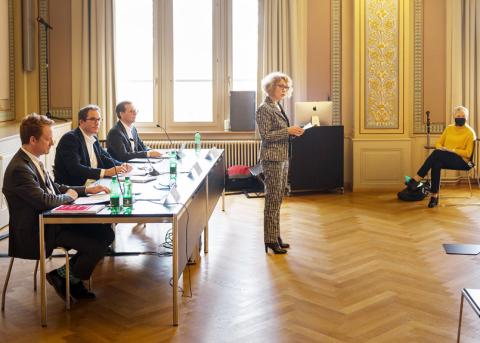The Assange case: Hope lies with Geneva
Last week, a London court ruled that Wikileaks founder Julian Assange ought to be extradited to the US. In Switzerland, people are calling for a humanitarian visa.
‘Could we meet in Geneva in four hours?’ When Denis Simonet discovered this subject line in his inbox at the beginning of November 2010, he didn’t hesitate.
The then president of the Swiss Pirate Party and his vice president got into their car immediately and drove southwest meeting a man who shortly before dared to defy the world’s superpower, the US. This man revealed war crimes committed by the US military. This man was none other than Julian Assange.
‘We sat in the most quiet corner of a Pizzeria with our backs to the wall. Assange was accompanied by a bodyguard and two assistants. In the beginning, he spoke softly and was clearly worried that someone could be watching him,’ recollects Simonet. For days, he’s been trying to get hold of a meeting with Assange.
‘Us Pirates knew that a platform such as Wikileaks for more transparency was much needed. Democracy cannot do without shedding light on truth and injustices even if it is against the will of the powerful.’
The Pirate Party members wanted to inform Assange and his allies at Wikileaks about the local legal system. Assange was contemplating to seek political asylum in Switzerland. ‘Back then, he had already come under immense political and legal pressure. Particularly as in summer 2010, there was a warrant issued for his arrest on the grounds of rape allegations,’ says Simonet.
Deterrence took effect
Eleven years later, Julian Assange who had been serving two and a half years in the British maximum security prison Belmarsh found himself in a terrible situation.
Last Friday, a London appeal court overturned the extradition ban which had been introduced due to the fifty-year-old Wikileaks founder’s precarious mental and physical state of health.
The US wanted to see Assange being indicted for charges of espionage. In case of a (expected) conviction, he could be charged with a prison sentence of up to 175 years. Assange’s lawyers announced that they will want to challenge the court’s decision.
It will take another few months until we know how the case will be proceeded with.
In Belmarsh, Assange is held on counts of risk of absconding. Prior to this, he spent seven years in the Ecuadorian Embassy in London. Shortly after last Friday’s court ruling, it was announced that this autumn, Assange had suffered from a minor and presumably stress-related stroke. A psychiatric assessment had already declared him to be at acute risk of suicide.
However, the Assange case goes beyond his personal fate. ‘At the core of all this, lies the freedom of press and the ailing thereof,’ voiced Nils Melzer towards WOZ. The UN special rapporteur lives in Biel and visited Assange in Belmarsh in 2019. He published his findings in his book ‘The Trial of Julian Assange: a Story of Persecution’.
‘The publisher who uncovered systematic war crimes of the US military in Iraq and Afghanistan is now being persecuted, cornered and locked away while those who committed and ordered those crimes, are enjoying impunity.’
‘They make an example of Assange,’ says Melzer. ‘It is irrelevant how the case is going to end, the US administration’s deterioration strategy has long fulfilled its purpose and sent a clear message: Who ever dares to uncover unpleasant truths will pay the price for it.’
At the beginning of November 2010, it was yet unknown how powerful Assange’s leverage over the US was. At an assembly of the UN Human Rights Council, allegations of torture against the US were supposed to be investigated.
Mainly because since earlier that year, Wikileaks had published hundreds of thousands of documents on the US warfare in Afghanistan and Iraq. It was revealed that civilians had been tortured and murdered at the hands of the US army.
Switzerland starts crumbling
On the day before said UN Assembly in Geneva, the Wikileaks founder purposely tried to address the public and was on collision course.
During his famous appearance at the Swiss press club he said, ‘If the US wants to credibly defend human rights, they have to investigate their human rights allegations.’ Instead of heeding his advice, the US authorities took an aggressive stance towards his organisation. Assange tells us that they threatened him publicly and tried to destroy Wikileaks. He further says, ‘The US is about to lose its reputation as the patron of freedom of speech and human rights.’
In Switzerland, Assange’s statements on possibly seeking political asylum in Switzerland caused an uproar. In an interview with the TV channel of the French-speaking part of Switzerland (RTS), Assange said that he and his company Wikileaks might settle down in Switzerland. In the blink of an eye, Donald S. Beyer, former US ambassador, made a press statement: Switzerland should think carefully about whom they want to offer refuge from legal persecution.
The blunt warning took effect. Shortly after, Federal Councillor Ueli Maurer of the Swiss Popular Party (SVP) announced in the newspaper ‘SonntagsBlick’, ‘To my knowledge and therefore, there is no reason to grant Swiss asylum to Mr Assange.’
The venture never stood a serious chance from the beginning. Assange left Geneva and moved to London where he turned himself in.
After the ruling of last Friday, the Swiss government still adheres to its passive role. The Federal Department of Foreign Affairs (FDFA) has been ‘closely following the case of Mr Assange for years’ and took note of the latest ruling made by the British court, writes the FDFA upon inquiry.
However, ‘the view that Mr Assange cannot be described as a human rights defender’ remains unchanged.
The FDFA does not provide explicit comments on the latest court ruling or a potential Swiss humanitarian visa for Assange. Instead, the FDFA refers to the current foreign policy strategy of the Federal Council where the protection of free speech is outlined as a priority.
While the Swiss Popular Party (SVP) and the Liberal Democratic Party (FDP) ignore inquiries made by WOZ, and the Centre Party as well as the Green Liberal Party (GLP) say that they will not give a statement, the Green Party and Social Party do not mince their words. ‘This court ruling is a bitter blow for the freedom of press worldwide which could contribute to more self-censorship in journalism,’ says the Social Party.
Due to Assange’s precarious mental and physical state of health and his looming extradition to the US, the Social Party backs the proposal of a humanitarian visa for him. Geneva’s Councillor of States, Carlo Sommaruga, has urged the Federal Council on several occasions to grant such a visa. Unfortunately without it bearing fruit. ‘When it comes to human rights protection, Switzerland is often just as hypocritical as the US. Human rights are only worth of protection as long as no important trade partner is being offended,’ criticises the Social Party.
Little effort has been made
To the Greens, the ruling is ‘just another consolidating cobblestone in the pavement of intimidation’.
‘The extradition of Assange to the US would be a severe setback for journalism as the Fourth Estate,’ says National Councillor Aline Trede and advocates for Julian Assange receiving a humanitarian visa.
Switzerland, a country that fights for humanitarian values, commits to a solid democratic system and presents itself as a patron of human rights would be an ideal country for this, says Trede.
Both Parties further refer to Geneva. In February 2020, the parliament obliged the State Council per resolution to file an application for a humanitarian visa for Assange at the Federal Council and the competent authority respectively. However, since then Geneva’s State Council has made little effort.
Simonet and his Pirate Party already wanted to bring Assange and Wikileaks to Switzerland in 2010. ‘Unfortunately, Switzerland did not seem attractive enough for them when we met at that Pizzeria. To my knowledge, he never applied for asylum here,’ says Denis Simonet. He has abandoned almost all political activities since then.
Were the proposal for a humanitarian visa ever to be a real political opportunity, then he would fight for it. Due to the latest court ruling, this issue is more pressing than ever.
This article was translated by Isabel Ringgenberg

